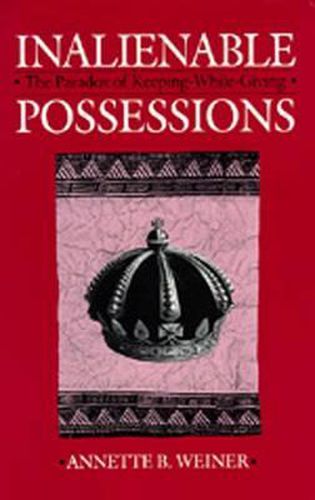Readings Newsletter
Become a Readings Member to make your shopping experience even easier.
Sign in or sign up for free!
You’re not far away from qualifying for FREE standard shipping within Australia
You’ve qualified for FREE standard shipping within Australia
The cart is loading…






This book tests anthropology’s traditional assumptions about kinship, economics, power and gender in a challenge to accepted theories of reciprocity and marriage exchange. Focusing on Oceania societies from Polynesia to Papua New Guinea and including Australian Aborigine groups, the author investigates the category of possessions that must not be given or, if they are circulated, must return finally to the giver. Reciprocity, she says, is only the superficial aspect of exchange, which overlays much more politically powerful strategies of keeping-while-giving . The idea of keeping-while-giving places women at the heart of the political process, however much that process may vary in different societies, for women possess a wealth of their own that gives them power. Power is intimately involved in cultural reproduction and the author describes the location of power in each society, showing how the degree of control coincides with women’s rank and the development of hierarchy in the community. Other inalienable possessions, whether material objects, landed property, ancestral myths, or sacred knowledge, bestow social identity and rank as well. Calling attention to their presence in We
$9.00 standard shipping within Australia
FREE standard shipping within Australia for orders over $100.00
Express & International shipping calculated at checkout
This book tests anthropology’s traditional assumptions about kinship, economics, power and gender in a challenge to accepted theories of reciprocity and marriage exchange. Focusing on Oceania societies from Polynesia to Papua New Guinea and including Australian Aborigine groups, the author investigates the category of possessions that must not be given or, if they are circulated, must return finally to the giver. Reciprocity, she says, is only the superficial aspect of exchange, which overlays much more politically powerful strategies of keeping-while-giving . The idea of keeping-while-giving places women at the heart of the political process, however much that process may vary in different societies, for women possess a wealth of their own that gives them power. Power is intimately involved in cultural reproduction and the author describes the location of power in each society, showing how the degree of control coincides with women’s rank and the development of hierarchy in the community. Other inalienable possessions, whether material objects, landed property, ancestral myths, or sacred knowledge, bestow social identity and rank as well. Calling attention to their presence in We